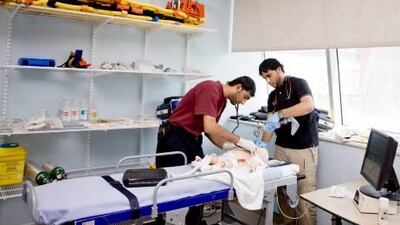ABU DHABI // Fewer students have been offered places at the three federal universities this year, despite a rise in numbers at two of them.
The overall 6 per cent reduction - from 12,257 offers last year to 11,532 this year - is the result of fewer places being offered by the Higher Colleges of Technology (HCT), which has a big shortfall in its budget.
The federal university has places for 5,533 students across its 17 campuses this year, which is down 31 per cent from last year's 8,024.
The number of offers to men fell sharply, down 38 per cent to 2,294 from 3,719 last year. The number of places offered to women fell by a quarter, to 3,239 from 4,305.
The other two federal universities offered more places this year.
UAE University had a rise of 65 per cent in offers, to 3,727 from 2,256, while Zayed University made 15 per cent more, to 2,272 from 1,977.
Overall, at least one in seven applicants was rejected.
In January, The National reported 13,688 students had applied and at least 1,000 more were expected as late applicants.
The reduction at HCT is also partly due to the colleges' higher entry requirements this year.
They no longer offer diploma courses and students have to earn a minimum high school average score of 70, a Common Educational Proficiency Assessment (Cepa) score of 140 in English and a pass in the Cepa maths certificate.
Previously, about 90 per cent of HCT students had to take remedial courses before starting study to bring them up to the required standards in maths, English and IT. About 20 per cent fail the remedial course or drop out within the first year.
The Minister of Higher Education and Scientific Research, Sheikh Nahyan bin Mubarak, said that was a waste of time for students and institutions.
Youmna Badowah, the director of the National Admission and Placements Office, said the changes were essential for HCT.
"Too many students are not able to complete their first year," Ms Badowah said.
The three federal universities all teach in English, which is a challenge for many school leavers.
Dr Farid Ohan, the director of the Sharjah colleges, welcomed the new requirements.
"There is always a percentage of students for whom studying in English does not work," Dr Ohan said.
"They usually cannot pass the foundation programme, even though a semester or two in college may have been socially and personally useful for them. In the past, a few of them may have even made it into diploma programmes but now that HCT does not offer diploma programmes, it makes more sense to select the students who are most likely to succeed."
Students not offered places might be better off at community colleges, Dr Ohan suggested. "This may also have a sobering effect on current high school students, because they now know that they are not guaranteed admission, regardless of their academic results," he said.
Sheikh Nahyan reiterated the country's commitment to making higher education available to every high school leaver.
Alternatives would be available for those who did not get into federal university, including at vocational colleges. "There are many other institutions for the people not admitted," Sheikh Nahyan said.
The changes at HCT have been made with budgetary concerns in mind. The colleges have struggled for cash since 2005 and began overdraft borrowing in 2009.
In June, The National reported the federal universities would begin the coming academic year with a Dh428million shortfall. Of those, the worst hit is HCT, which was set to be short Dh333m, or 25.8 per cent of its budget.
"This is naturally all about budget, or lack thereof, so naturally if the HCT has to reduce the number of students, the place to start is with the apparent weakest students," said Dr Howard Reed, the director of the Dubai Women's College. "This is of course what we have always done, so there is nothing new about it."
Dr Reed said introducing fees and allowing mature students to enter the federal institutions might help. "If the Government cannot afford to let all of the students in they should allow students to pay their own way in the federal institutions," he said.
"Likewise, as in most of the rest of the world, if a person develops themselves by working and wants to attend college later, they should be allowed to do so.
"I think the mature market in the UAE is the most important market and the easiest to educate."
Dr Reed said a benefit of the old open system was the opportunity it afforded "late bloomers".
"We know that some of the students who did not get admitted would have succeeded and some who were admitted will fail, but this is true everywhere," he said.
He said while the higher entry requirements might improve the foundation pass rates, they would not lessen the need to provide foundation programmes.
"Behind all of this is the need to drastically improve the quality of education of students before they apply for post-secondary education," Dr Reed said.

